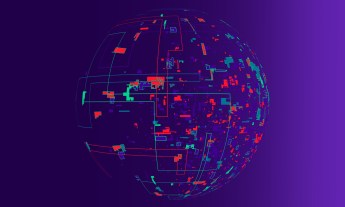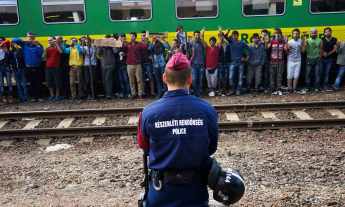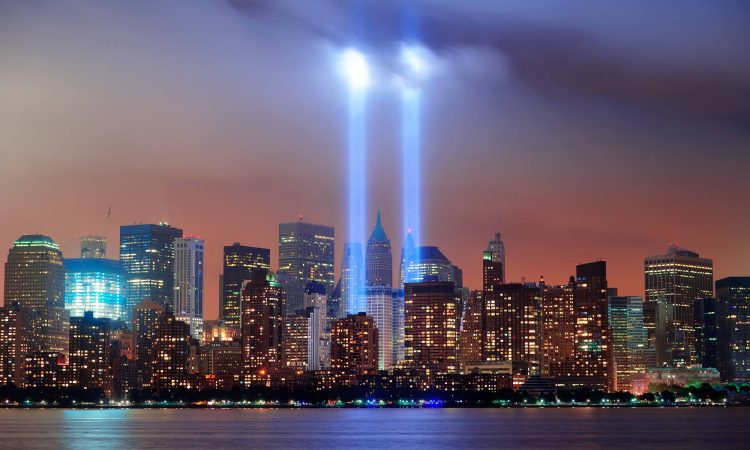
Zak Ebrahim is the son of a terrorist. Phyllis Rodriguez lost her son on 9/11. In an inspiring conversation, the two share their personal histories of lives devastated by violence — and rebuilt by tolerance.

Zak Ebrahim’s father was convicted of plotting the 1993 bombing of the World Trade Center. Phyllis Rodriguez’s son, Greg, worked in the World Trade Center. While Greg happened to have left the building the day of the bombing in 1993, he was killed on September 11, 2001.
Both Ebrahim and Rodriguez have seen their families upended by terrorism, in very different ways. And yet, each of them delivers the same powerful message: that peace, tolerance and empathy are the only way forward.
In his TED Talk (Watch: I am the son of a terrorist. Here’s how I chose peace) and book (read: The Terrorist’s Son: A Story of Choice), Ebrahim shares how he was able to transcend extremism. And in her TED Talk (Watch: The mothers who found forgiveness, friendship), Rodriguez shares how she formed an unlikely friendship with Aicha el-Wafi, the mother of Al Qaeda conspirator Zacarias Moussaoui, by identifying with her as another mother in pain.
We connected Rodriguez and Ebrahim via Skype for a discussion on the power of empathy. Below, read an edited transcript, in which they talk candidly about bullying, forgiveness and family.
After my son was killed, I realized that I didn’t want revenge. I knew I didn’t want anyone to be executed.
Both of your stories are, at their core, about the incredible things that can happen when we dare to have empathy. Why is empathy such a powerful thing?
Phyllis Rodriguez: Because the cycle of violence will never end, unless we put a stop to it. That’s why nonviolence is so important in the world.
After my son was killed, I realized that I didn’t want revenge. I knew I didn’t want anyone to be executed. We didn’t want military responses, because we knew it would be wrong and that it would be done in the name of our son. And sure enough, look at the last 13 years and the whole escalation of violence.
One of the things I thought of early on after the attacks in 2001 was how the families of the 19 hijackers were dealing with this — how they felt. When I saw Zacarias Moussaoui’s mother in the media, I really felt for her. She was also a mother who was suffering, but people didn’t see her and say, “Oh, I feel for you. Oh, your poor son. Your son was a hero.” For her it was, “What did you do to create such a horrible human being?” I thought: Why are we different? Why shouldn’t she get the same sympathy and understanding that I was getting?
For me, the intention in sharing my story isn’t to make people feel sorry for me, but to show — without trying to take any of the spotlight off the victims or the victims’ families — that my family was destroyed by terrorism too.
Zak Ebrahim: That really is just extraordinary. I don’t know many people who have that kind of empathy inside of them. To have gone through what you went through and still come out of it trying to empathize with the family of a man who had caused such devastation in your life — I mean really, it’s just astonishing.
For me, the intention in sharing my story isn’t to make people feel sorry for me, but to show — without trying to take any of the spotlight off the victims or the victims’ families — that my family was destroyed by terrorism too. We suffered consequences the day my father left [for prison]. My mother’s intention was to be a Muslim housewife and to have my father be the breadwinner. After he left, it became her sole responsibility to pay the bills. We had to move around a lot to wherever she could find work. My mother was a private Islamic school teacher, and when word got out to the community that she was the wife or ex-wife of El-Sayyid Nosair, oftentimes that was the end of her job. We had to keep secret who we were.
Phyllis Rodriguez: It takes a lot of courage to speak out. In my case, what I realized very early on was that, because of the culture we have, it’s automatically expected that you’re going to want revenge. But my opinions about the death penalty were no different on September 11, 2001, than they were on September 10. All that changed was that I had a voice — that people listened. That’s why people want to hear you too. We’ve lived through it. Maybe we can be instruments of change.
Our culture is a culture of violence. And in the United States, we also have a very isolationist history. I don’t know if you remember, but there was a man several years ago who went into an Amish school and killed students and teachers. He was arrested right away. That evening, a delegation of people from the community — including family members of victims — went to visit his wife and kids, and said, “How can we help you?” That was seen as an aberration.
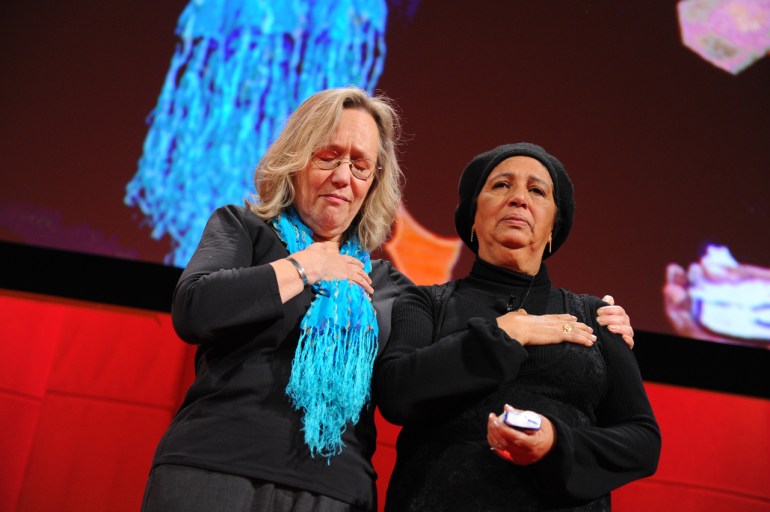
Phyllis, your son was working at the World Trade Center in 1993. How did you find out about the bombing that day?
Phyllis Rodriguez: I was driving to my mother’s house in the Bronx, listening to the radio, and they interrupted to announce what had happened. My heart jumped into my mouth. At that point, I didn’t know which building he worked in, what floor he worked on — maybe he had told me, but it didn’t sink in. We didn’t have cell phones then, so as soon as I got to my mother’s, I said, “We have to call Greg.” We tried calling him; he didn’t answer. I left him many messages. About a half hour later, he called up and said, “Ma, I got your messages. I was in Jersey — I didn’t know what had happened until I came home.” My mother burst into tears. She said, “We can’t let him work there.”
Zak, you were only seven years old in 1993. Did you know about the bombing? Did you have the sense that something was going on?
Zak Ebrahim: I was actually home from school that day. It was a Friday, if I recall correctly. I’d been having a lot of trouble with bullying, so occasionally, my mother would let me stay home when I told her that I just wasn’t up for it. I was sitting in the living room, watching Harry and the Hendersons on television, and it was interrupted by breaking news saying that there was smoke coming out of the World Trade Center. I went into my mother’s bedroom to try to tell her that something was going on. I had no way of connecting it to Islamic terrorism — certainly not to my father.
I pretty much sat there all day, watching the news. Watched the people being pulled out, covered in smoke. I saw everything unfolding on television as it happened, but I had no idea that it was going to affect our family’s life in the way that it did. I had no idea, watching the news coverage that day, that I would never see my father outside of a prison cell again.
I don’t have a whole lot of memories of him from before he left. Now, they kind of meld together with the memories I have of him in prison. A lot of times, when I think back to that last moment I saw him as a free man, in my mind, he’s wearing an orange jumpsuit.
Phyllis Rodriguez: How old were you the last time you saw him at home?
Zak Ebrahim: I was seven. Every morning before he left for work, he would try to teach me to tie my shoes and I was unsuccessful. I’d walk out onto the stoop and just watch him walk down to the corner. He would turn around, and he’d wave goodbye. That was my last memory of him from before he went to prison. I don’t have a whole lot of memories of him from before he left. Now, they kind of meld together with the memories I have of him in prison. A lot of times, when I think back to that last moment I saw him as a free man, in my mind, he’s wearing an orange jumpsuit.
Phyllis Rodriguez: Do you visit him?
Zak Ebrahim: No, I haven’t visited him in over 15 years. We stayed in communication for a while, but when I was about 17, my whole family changed our names to hide our identity from him and from people that knew us, as well as from people who wished ill will toward us.
I didn’t talk to him at all for about 10 years. Actually, the day that I gave my first public speech, I was on the cover of the Philadelphia Daily News. By the time I got back to my hotel room after the speech, there was an email from one of his lawyers saying, “Your father has been looking for you for many years, and he’d really like to get in communication with you.” I was so shocked that I never even responded to the email.
About a year later, I got an email from the Bureau of Prisons saying that an inmate, El-Sayyid Nosair, wanted to begin communication, and that I had 10 days to respond yes or no. It took me about a week, but I ultimately decided that I did want to talk to him. That conversation turned out to be terrible. So ultimately, I decided that it wasn’t healthy for me to be in communication with him.
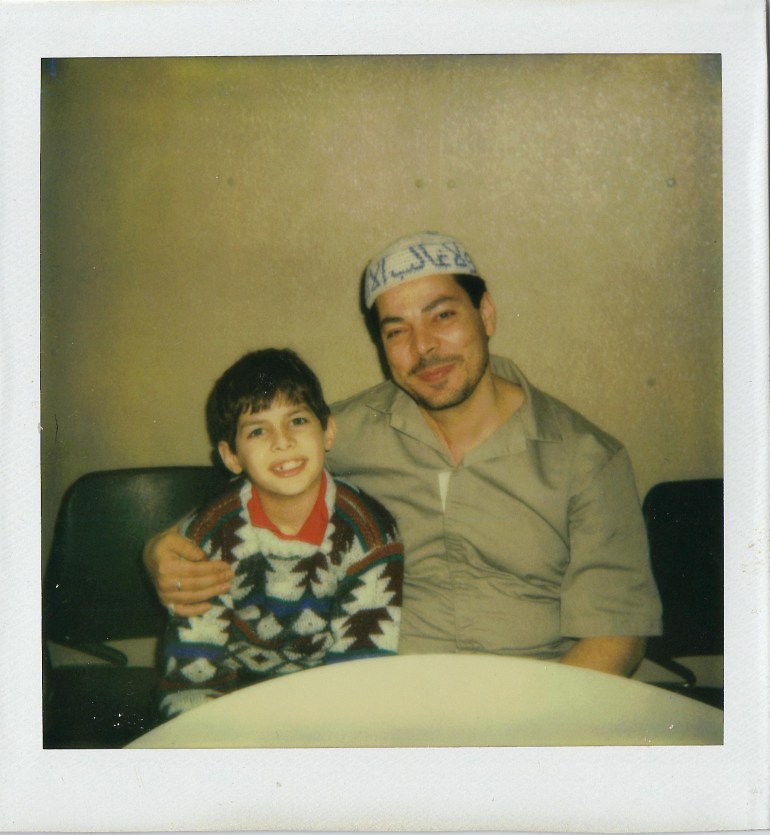
Phyllis Rodriguez: Am I right in getting the sense that he is not repentant? That he’s not looking within or questioning his beliefs, or taking responsibility for what he did — to you, to your family, or to society?
Zak Ebrahim: One of the difficult parts about talking to him through email was that I could never really tell if what he was telling me was the truth or just what he thought I wanted to hear, because he so badly wanted to be in communication. I always had to take everything that he wrote and try to look through that lens, which was very difficult. I can tell you what he told me. With regard to the bombing of the World Trade Center, at least, he maintains his innocence — and yet somehow also says that he wishes that they hadn’t gone to such extremes. He sent me letters that he had apparently been sending for years to world leaders trying to find peaceful resolutions to the Israeli-Palestinian conflict, for instance. But again, it’s just difficult for me to know when he was being genuine.
As far as taking responsibility, his answer to me was pretty much: it was all god’s plan. And for me, I’m an atheist, and that wasn’t what I wanted to hear. When I told him all of the struggles that I had with self-esteem and self-worth after being bullied and abused at home by my stepfather for so long, he basically just said, “It’s because you’re not Muslim anymore. If you became Muslim again, all of those problems would go away.” It wasn’t a healthy conversation, so I decided to cut it off.
In what ways have people let you know that your speaking up has been meaningful to them?
Phyllis Rodriguez: Both friends and strangers have said to me, “I don’t know if I could have done what you’re doing.” And I say, “I thought that too.” For so much of my life, when I read about some kind of reconciliation — the family of a murdered person sitting with the mother of the offender in court — I’d wonder if I could do that. You don’t know how you’re going to react to a situation. Part of me has always wanted to dig a hole and drop out and not talk — not necessarily to hide, but to be incognito. But the other part of me feels that it’s healthier to speak out and try to change our culture a bit.
One woman came up to me and said, “You probably don’t remember me, but I’m one of the agents that worked on your father’s case. I always wondered what happened to the children of El-Sayyid Nosair.”
Zak Ebrahim: The most emotional responses that I’ve gotten have been from the Muslim community. I’ve had so many Muslims come up to me with tears in their eyes, because I try to make people understand that growing up in the ideology that I grew up in is not the norm.
One of the most emotional experiences I had was when I spoke to a group of FBI agents and analysts, and a few of them formed a line afterward to talk to me. One woman — an agent — came up to me and said, “You probably don’t remember me, but I’m one of the agents that worked on your father’s case. I always wondered what happened to the children of El-Sayyid Nosair.” She told me how happy she was to see that I hadn’t followed in his footsteps, because even she had presumed that I would.
I also got the opportunity to speak to a large group of kids from Tuesday’s Children, which began as an organization for the families of 9/11 victims and eventually grew to one that helps families of victims of terrorist attacks all over the world. Here I am, sharing my story with kids as young as 12 years old, up to 22, people who — frankly — understand my story more than I can. What a humbling, incredible experience that was, getting to interact with all of them. To hear their stories of loss and how they want to do something positive from this negative experience.
Phyllis Rodriguez: That’s what connects us — not whether we were the victims or the perpetrators — but our feelings. How we see the world, what we want the world to be like, what we think relationships should be like.
Zak Ebrahim: That’s why empathy is so important. We don’t have to have the same experiences; it’s about the human emotions that we all feel. As unique as my experiences may be, we’ve all had those same emotions. That’s the important thing—that we can relate with one another.
Phyllis Rodriguez: Empathy. That’s where we started, right?
Featured image via iStock.









